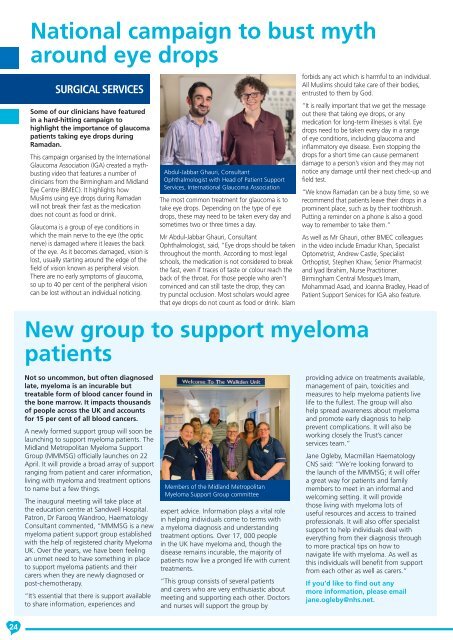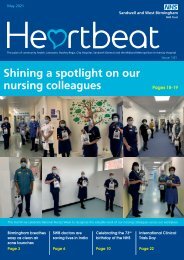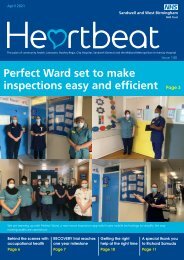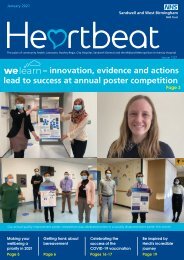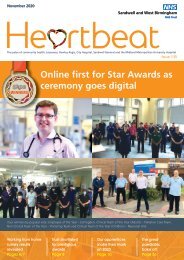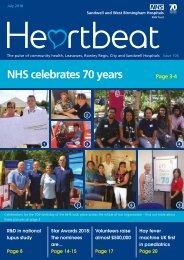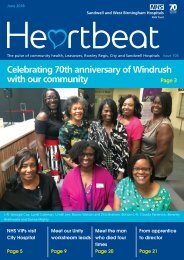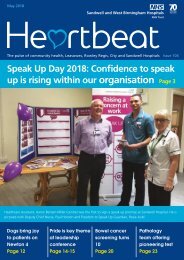Heartbeat March 2020
You also want an ePaper? Increase the reach of your titles
YUMPU automatically turns print PDFs into web optimized ePapers that Google loves.
National campaign to bust myth<br />
around eye drops<br />
SURGICAL SERVICES<br />
Some of our clinicians have featured<br />
in a hard-hitting campaign to<br />
highlight the importance of glaucoma<br />
patients taking eye drops during<br />
Ramadan.<br />
This campaign organised by the International<br />
Glaucoma Association (IGA) created a mythbusting<br />
video that features a number of<br />
clinicians from the Birmingham and Midland<br />
Eye Centre (BMEC). It highlights how<br />
Muslims using eye drops during Ramadan<br />
will not break their fast as the medication<br />
does not count as food or drink.<br />
Glaucoma is a group of eye conditions in<br />
which the main nerve to the eye (the optic<br />
nerve) is damaged where it leaves the back<br />
of the eye. As it becomes damaged, vision is<br />
lost, usually starting around the edge of the<br />
field of vision known as peripheral vision.<br />
There are no early symptoms of glaucoma,<br />
so up to 40 per cent of the peripheral vision<br />
can be lost without an individual noticing.<br />
Abdul-Jabbar Ghauri, Consultant<br />
Ophthalmologist with Head of Patient Support<br />
Services, International Glaucoma Association<br />
The most common treatment for glaucoma is to<br />
take eye drops. Depending on the type of eye<br />
drops, these may need to be taken every day and<br />
sometimes two or three times a day.<br />
Mr Abdul-Jabbar Ghauri, Consultant<br />
Ophthalmologist, said, “Eye drops should be taken<br />
throughout the month. According to most legal<br />
schools, the medication is not considered to break<br />
the fast, even if traces of taste or colour reach the<br />
back of the throat. For those people who aren’t<br />
convinced and can still taste the drop, they can<br />
try punctal occlusion. Most scholars would agree<br />
that eye drops do not count as food or drink. Islam<br />
forbids any act which is harmful to an individual.<br />
All Muslims should take care of their bodies,<br />
entrusted to them by God.<br />
“It is really important that we get the message<br />
out there that taking eye drops, or any<br />
medication for long-term illnesses is vital. Eye<br />
drops need to be taken every day in a range<br />
of eye conditions, including glaucoma and<br />
inflammatory eye disease. Even stopping the<br />
drops for a short time can cause permanent<br />
damage to a person’s vision and they may not<br />
notice any damage until their next check-up and<br />
field test.<br />
“We know Ramadan can be a busy time, so we<br />
recommend that patients leave their drops in a<br />
prominent place, such as by their toothbrush.<br />
Putting a reminder on a phone is also a good<br />
way to remember to take them.”<br />
As well as Mr Ghauri, other BMEC colleagues<br />
in the video include Emadur Khan, Specialist<br />
Optometrist, Andrew Castle, Specialist<br />
Orthoptist, Stephen Khaw, Senior Pharmacist<br />
and Iyad Ibrahim, Nurse Practitioner.<br />
Birmingham Central Mosque’s Imam,<br />
Mohammad Asad, and Joanna Bradley, Head of<br />
Patient Support Services for IGA also feature.<br />
New group to support myeloma<br />
patients<br />
Not so uncommon, but often diagnosed<br />
late, myeloma is an incurable but<br />
treatable form of blood cancer found in<br />
the bone marrow. It impacts thousands<br />
of people across the UK and accounts<br />
for 15 per cent of all blood cancers.<br />
A newly formed support group will soon be<br />
launching to support myeloma patients. The<br />
Midland Metropolitan Myeloma Support<br />
Group (MMMSG) officially launches on 22<br />
April. It will provide a broad array of support<br />
ranging from patient and carer information,<br />
living with myeloma and treatment options<br />
to name but a few things.<br />
The inaugural meeting will take place at<br />
the education centre at Sandwell Hospital.<br />
Patron, Dr Farooq Wandroo, Haematology<br />
Consultant commented, “MMMSG is a new<br />
myeloma patient support group established<br />
with the help of registered charity Myeloma<br />
UK. Over the years, we have been feeling<br />
an unmet need to have something in place<br />
to support myeloma patients and their<br />
carers when they are newly diagnosed or<br />
post-chemotherapy.<br />
“It’s essential that there is support available<br />
to share information, experiences and<br />
Members of the Midland Metropolitan<br />
Myeloma Support Group committee<br />
expert advice. Information plays a vital role<br />
in helping individuals come to terms with<br />
a myeloma diagnosis and understanding<br />
treatment options. Over 17, 000 people<br />
in the UK have myeloma and, though the<br />
disease remains incurable, the majority of<br />
patients now live a pronged life with current<br />
treatments.<br />
“This group consists of several patients<br />
and carers who are very enthusiastic about<br />
meeting and supporting each other. Doctors<br />
and nurses will support the group by<br />
providing advice on treatments available,<br />
management of pain, toxicities and<br />
measures to help myeloma patients live<br />
life to the fullest. The group will also<br />
help spread awareness about myeloma<br />
and promote early diagnosis to help<br />
prevent complications. It will also be<br />
working closely the Trust’s cancer<br />
services team.”<br />
Jane Ogleby, Macmillan Haematology<br />
CNS said: “We’re looking forward to<br />
the launch of the MMMSG; it will offer<br />
a great way for patients and family<br />
members to meet in an informal and<br />
welcoming setting. It will provide<br />
those living with myeloma lots of<br />
useful resources and access to trained<br />
professionals. It will also offer specialist<br />
support to help individuals deal with<br />
everything from their diagnosis through<br />
to more practical tips on how to<br />
navigate life with myeloma. As well as<br />
this individuals will benefit from support<br />
from each other as well as carers.”<br />
If you’d like to find out any<br />
more information, please email<br />
jane.ogleby@nhs.net.<br />
24


